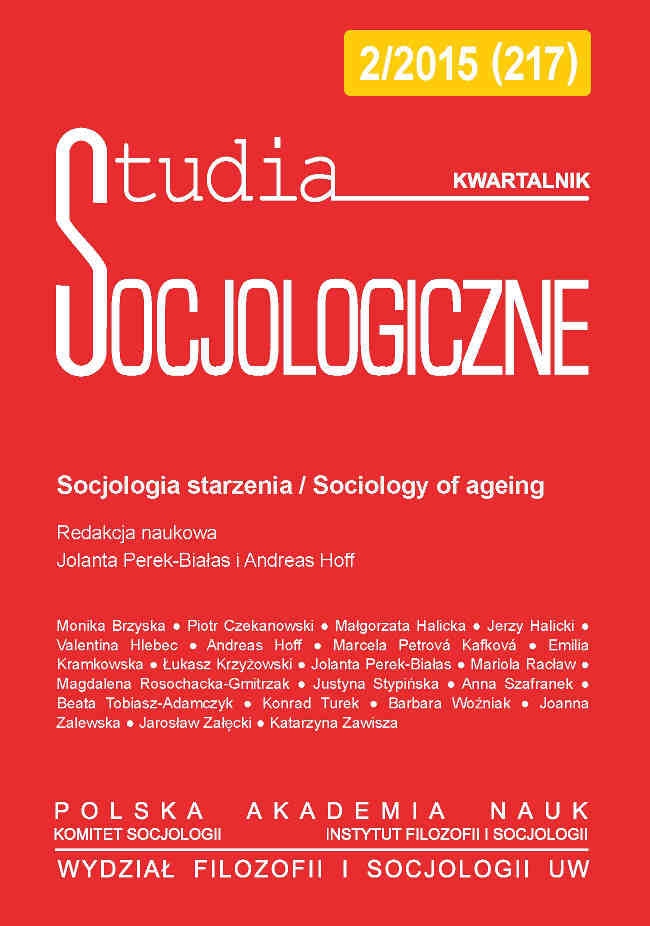Studia Socjologiczne
Sociological Studies
Publishing House: Instytut Filozofii i Socjologii Polskiej Akademii Nauk
Subject(s): Social Sciences
Frequency: 4 issues
Print ISSN: 0039-3371
Online-ISSN: 2545-2770
Status: Active
- 2004
- 2005
- 2006
- 2007
- 2008
- 2009
- 2010
- 2011
- 2012
- 2013
- 2014
- 2015
- 2016
- 2017
- 2018
- 2019
- 2020
- 2021
- 2022
- 2023
- 2024
- Issue No. 4/175
- Issue No. 1/176
- Issue No. 2/177
- Issue No. 3/178
- Issue No. 4/179
- Issue No. 1/180
- Issue No. 2/181
- Issue No. 3/182
- Issue No. 4/183
- Issue No. 1/184
- Issue No. 2/185
- Issue No. 3/186
- Issue No. 4/187
- Issue No. 1/188
- Issue No. 2/189
- Issue No. 3/190
- Issue No. 4/191
- Issue No. 1/192
- Issue No. 2/193
- Issue No. 3/194
- Issue No. 4/195
- Issue No. 1/196
- Issue No. 2/197
- Issue No. 3/198
- Issue No. 4/199
- Issue No. 1/200
- Issue No. 2/201
- Issue No. 3/202
- Issue No. 4/203
- Issue No. 1/204
- Issue No. 2/205
- Issue No. 3/206
- Issue No. 4/207
- Issue No. 1/208
- Issue No. 2/209
- Issue No. 3/210
- Issue No. 4/211
- Issue No. 1/212
- Issue No. 2/213
- Issue No. 3/214
- Issue No. 4/215
- Issue No. 1/216
- Issue No. 2/217
- Issue No. 3/218
- Issue No. 4/219
- Issue No. 1/220
- Issue No. 2/221
- Issue No. 3/222
- Issue No. 4/223
- Issue No. 1/224
- Issue No. 2/225
- Issue No. 3/226
- Issue No. 4/227
- Issue No. 1/228
- Issue No. 2/229
- Issue No. 3/230
- Issue No. 4/231
- Issue No. 1/232
- Issue No. 2/233
- Issue No. 3/234
- Issue No. 4/235
- Issue No. 1/236
- Issue No. 2/237
- Issue No. 3/238
- Issue No. 4/239
- Issue No. 1/240
- Issue No. 2/241
- Issue No. 3/242
- Issue No. 4/243
- Issue No. 1/244
- Issue No. 2/245
- Issue No. 3/246
- Issue No. 4/247
- Issue No. 1/248
- Issue No. 2/249
- Issue No. 3/250
- Issue No. 4/251
- Issue No. 1/252
Articles list
{{ article.TitleOriginalLanguage }}
{{ article.TitleOriginalLanguage }}
({{ article.TitleEnglish }})
- Publication: {{ article.Publisher }} ({{ article.Issue }})
- Author(s): {{ article.Authors }}
- Contributor(s): {{ article.Contributors }}
- Language: {{ article.Language }}
- Subject(s): {{ article.Subjects }}
- Issue: {{ article.Issue }}
- Page Range: {{ article.PageRange }}
- No. of Pages: {{ article.NumberOfPages }}
- Keywords: {{ article.Keywords }}
- Summary/Abstract: {{ article.SummaryAbstract }}
- Price: {{ common.currency(article.Price) }}
Short Description
Studia Socjologiczne was initially sponsored by the Institute of Philosophy and Sociology of the Polish Academy of Sciences but since the third issue of 1970, jointly by the Institute and the Committee on Sociological Sciences (today – Committee on Sociology) of this Academy. The Committee is a small body (about thirty members) elected for three years by all scholars who have habilitation degree in sociology or, having habilitation in other fields, are recognized by the previous Committee as sociologists. Zygmunt Bauman (who worked at that time at Warsaw University) became the first editor-in-chief (but his name as the editor-in-chief appears only in the third issue of 1962). Władysław Markiewicz was the next editor (1968-1991), followed by Jolanta Kulpińska (1991-1997), Henryk Domański (1997-2000) and Janusz Mucha (2001 to the present). Keeping up with very high standards in the development of theory, empirical research and methodology continues to be the most important objective of the Board. We will attempt to accomplish these goals in such a way that Studia continues to be an important center for the exchange of interpretations and findings of scholarly analysis of society. We will be publishing texts representing all areas of sociology, both theoretical analyses and empirical studies, contributing to generalizations about social phenomena. We accept various forms of texts: from sociological essays to systematic reflection to methodologically sophisticated quantitative analyses. The objectives of Studia are in particular: -- keeping contacts between Polish sociology and international sociology by critical presentation and interpretation of what sociologists in other countries study and how they do it; -- analysis of social processes occurring in today's world, in its various regions, predominantly in Central and Eastern Europe; -- analysis of the most important social phenomena in Poland during the period of the development of the new economy, new social structure, and new culture.

